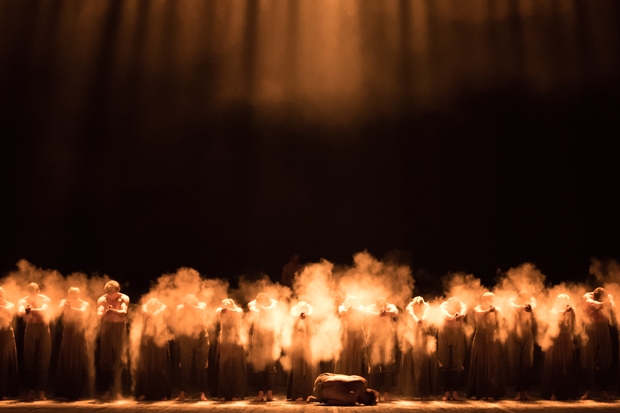If there’s one thing scarcer than hen’s teeth in serious choreography nowadays, it’s a light heart. When was the last time we had something jolly created in the artform that brought us La Fille mal gardée, Coppélia and Les biches?
Still, the first week of the start of the dance year was all good stuff, if sombre (and Les Ballets Trockadero de Monte Carlo are over from New York at the Peacock right now, thank heavens). English National Ballet’s Lest We Forget bill of new ballets was made last year for the start of the first world war centenary, but deserved repeating as a demonstration of serious ballets by accomplished choreographers.
War ballets tread a fine line between pacifist drool and emotional catharsis. The latter sometimes arrives with the assistance of the music (Kenneth MacMillan’s Gloria), the shock of representation (Rosie Kay’s 5 Soldiers), or the atavistic understanding of group dynamics (Crystal Pite’s Polaris with Thomas Adès, which just felt like one of the great war ballets even if not billed as one).
Liam Scarlett tackles wartime imagery most literally and most sentimentally. His munitions-factory women, with their gunpowder-white hands, cling to the backs of their departing men in a clever emulation of a knapsack, but the angel imagery is soft-centred, urged on by the muddy sobs of the Liszt adapted score. While it’s brave of Scarlett to choreograph in slo-mo, nothing remarkable surfaces from the sepia.
Russell Maliphant is not an overtly emotional type, and in Second Breath his waves of young men eddy and flow like the night-time sea, thrown up haplessly by their group sweepings to catch the light overhead, as if floating for a moment, before crashing down into the dark. The potency of this fluid repetition is due to its emulsion with Michael Hulls’s mesmerisingly ethereal lighting, but the overall impact would be much greater in silence.
Akram Khan’s Dust is hotter, sweatier, studded with arresting details of resistance and individual suffering beginning with the writhing man on the floor whose hands link into gigantic chains of other human arms. The women shake their fists as if to reproach the gods, and in the fabulously intimate, legwrapping duet at the end Tamara Rojo and James Streeter evoke the intense tragedy of the damage caused by war to a deep passion between two people. I suppose that today a war ballet might be about refugees. There’s a thought.
Why on earth Jonathan Watkins, a mild choreographer who emerged barely noticed from the Royal Ballet, thought George Orwell’s Nineteen Eighty-Four would be a good idea for his first full-length ballet I can’t imagine — but well done, him. Northern Ballet, which has spent years rifling Penguin Classics for ballet subjects, pulping every good book it found to deafening public acclaim, finally gets a cheer from me as well.
The key to dealing with Nineteen Eighty-Four is not the forbidden love story between Winston and Julia, nor even the rats and Big Brother (Andrzej Goulding’s eye-watering ‘telescreens’ achieve this tremendously well). What keeps Orwell’s story alive is the idea of the killing of thought and feeling by Newspeak, the totalitarian process of language reduction. This is the truly horrible idea of Nineteen Eighty-Four, which Isis today refuels even when much else of Orwell’s mechanically apocalyptic 1949 vision has been rewritten by the internet and the robustness of individuality.
The irony is that Watkins does Newspeak awfully well with his choreography. I’m not sure if that comes out quite as a compliment, but the limitations of his palette to elements of classroom ballet and much dance-pantomime, and Andy Baranowski’s unlovely, reductionist music, do a perfect job here. The Two-Minute Hate ensembles have the angles of inarticulate shrieking, and the couples behave with a brusque indifference to bodily contact with each other — that’s good.
Martha Leebolt is a tremendous first-cast Julia, every inch the tough, brainwashed young social product, but Tobias Batley is a blank Winston Smith, wafting around like a milky ballet prince. The two men who manipulate the lovers are miscalculated: the ambiguous old antique-shop owner Mr Charrington should be old — that’s the point — and surely O’Brien needs a far more vivid solo to show his deceptive allure. But again, maybe that’s dance Newspeak for you.
War and totalitarianism pale, though, as ballet subjects by comparison with handicap and mental disability. For 35 years Amici Dance Theatre has mustered disabled people of all conditions in Wolfgang Stange’s periodic, sometimes thunderingly remarkable productions.
35 Amici Drive, about a fight by disabled people to keep their homes from property developers, took five hard years to make and its performances last week at the Lyric Hammersmith showed — even if you leave your heart at home — Stange’s fine, unsentimental eye for making resonant choreography from extreme limitations. A duet for young man and older woman, both crippled with cerebral palsy, a trio around a wheelchair-bound young beauty, an amusing script milking politicians’ Newspeak, your curious mind is often struck. And anyway, why leave your heart at home?






Comments